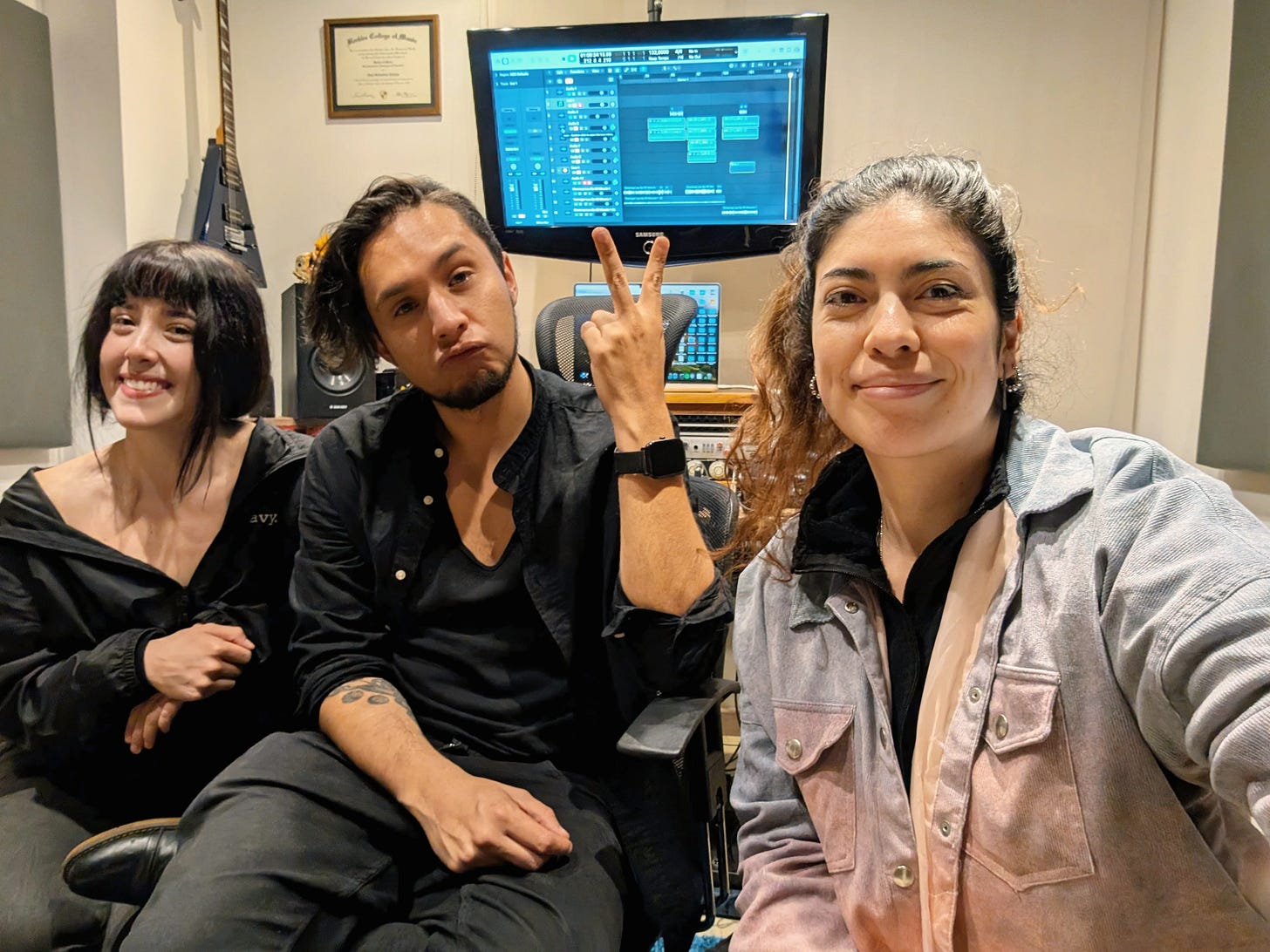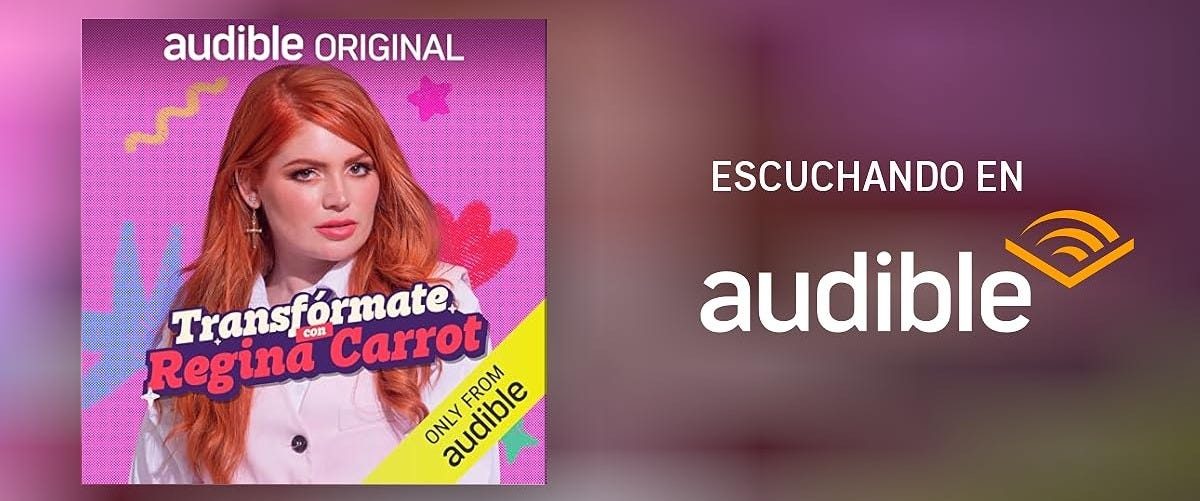A chat with Audible: the new home for Spanish-language narrative audio.
I spoke with Manny Miravete about his vision for Spanish-language audio production and the vision for 2025. Regina Carrot's Transformate, a 3Pas production, premieres.

Feliz domingo!
After a well-deserved break with total disconnection from social media... I’m back :) First, I’m very grateful to the new subscribers of this newsletter. For those getting to know me for the first time: Hi! I love storytelling and have been doing it for the past eight years through radio, podcasts, social media, print journalism, and audiobooks. I believe in the power of stories to transform cultures and grow together as a community. That’s why, in this newsletter, I write about my creative process and the Spanish-language audio industry.
In this edition, audiobooks are the new home for high-quality narrative audio in Spanish. For this issue, I asked Manny Miravete, Head of Original Spanish Language & In-Culture English Language Content at Audible, about his team's lessons in 2024 and their vision for 2025.
This year begins with beautiful releases. Next week, we’ll launch Episode 5 of Juventud Maldito Vacío. It’s a song called La balada del trabajo soñado (The ballad of the dreamy job). If you want to listen to it firsthand, subscribe here. Only 2 episodes remain for this podcast.

The second release is an Audible Original: Transfórmate con Regina Carrot, produced by 3Pas Studios(by Eugenio Derbez and Ben Odell). I had the honor of being the Story Editor for this project last year, and there are two things I love about it: It’s an audio guide for personal development, yes, but with an original format. Each episode is based on a real-life consultation and shares a practical exercise for transformation. This isn’t a conventional audiobook with an author simply reading aloud—it’s a mix of personal stories, journalism, and coaching. Episodes cover topics like: How to be in an open relationship, how to break up with someone responsibly, and how to help save your friend from a toxic relationship.
What I also love about this project is that we brought together accents from across the continent. While Regina Carrot is a Mexican influencer, we gathered 13 testimonies from her fans in 13 different countries. This is fundamental because Spanish-language content is now consumed on a regional level, so we wanted the series to have accents from all over the continent. Different countries, same conversation, this is the magic of having an international production team: Regina Carrot (Host), Cristy Marrero (Executive Producer), Angelina Mosher (Producer), Daniela Sarquis (Scriptwriter), Stephen Herman (Sound Director), Daniel Murcia (Sound Designer), Ana Bretón (Digital Producer), and I became an idea hub that developed this series shoulder-to-shoulder with the Audible team, 3Pas execution, and Regina’s team. Special thanks to Taylor Margis-Noguera, Sofía Cerda Campero, Lenda Ramos, Mariel López-Mota, and of course: Manny Miravete.
This Original wouldn't be what it is without everyone involved. Over 20 people contributed to the series, the full list is available in the audiobook, which I highly recommend listening to.
A chat with Manny Miravete from Audible
It feels like high-quality narrative audio has found a new home in audiobook production. That’s why I sat down to talk with Manny Miravete, Head of Original Spanish Language & In-Culture English Language Content at Audible, about his team’s 2024 recap and vision for 2025.
In a world where podcast platforms are focusing on video podcasts, Audible prefers to grow in the audiobook format and is particularly interested in fiction and documentary projects. What’s their specialty? Mixing editorial expertise with their audience data studies.
Laura: Manny, thanks for coming to Escribir en voz alta. How was 2024 for your team?
Manny: It was a year to reflect on what our customers want and the kind of content we should be not just acquiring, but also producing. We worked hard to refine the kind of work we do.
I know with you specifically, we had Transformate, and that is along the lines of the types of productions that we're looking for narrative-driven, but not multicast, something that you can take something away from. If you're a customer, nonfiction, specific direction in the self-dev and self-help space.
We have been producing series in different genres, and we realized that for our customers, that is a legacy audiobook customer, that's the type of format that they are comfortable with and like to listen to. We want to produce something that they continue to want to listen to and not necessarily make a lot of different types of shifts.
L: Many people in Latin America are new to Audible’s work in Spanish. Why audiobooks?
M: I don’t have the data in front of me, so it’s hard to get specific, but I do know it’s the fastest-growing category in Spanish. Audiobook consumption overall has been growing in recent years.
I think people are embracing the format because it’s so portable—you know, you can do it anywhere, anytime. And there’s so much to gain from it, not only learning and education, but also entertainment and simply disconnecting from the world to immerse yourself in the audio experience. We’re seeing this growth in Spanish-language audiobook listening, and that’s where we’re basing our strategies.
We have Whispersync technology, which syncs your eBook with your audiobook so you can seamlessly switch between reading and listening. You see a lot of that and that's really the key to what you're talking about in terms of the adoption of the format.
L: Of course. In terms of the audio industry overall, many are betting on video podcasts, and it seems like this preference for audiobooks is also a strategic choice—playing a different game from other platforms.
M: It’s more about the growth in audio consumption—not just audiobooks—which has almost doubled in Latin America. So audio in general continues to grow, and the types of formats consumed on what we call ad-supported or free platforms are different from those consumed on subscription platforms.
I mean premium subscription distributors or services like ours. Now, it’s not necessarily, “Oh, everyone’s doing podcasts, let’s focus on audiobooks.” That's not accurate at all. We're, we're also focusing on podcasts like content. We just want to ensure we offer the type of content that aligns with what the data shows our customers want to listen to. If you come into our service, we pay attention to many of the comments made. We’ve been fortunate to receive an overwhelming amount of positive feedback, especially regarding multicast podcasts and narrative-driven productions.
Many comments say things like, “Oh God, this was a great audiobook. I’ve never heard anything like it.” You’re not going to jump into the comments and tell your customers, “This isn’t an audiobook,” right? That’s the mindset of our customers, and it’s why we’re known for this. Despite that, we distribute many podcasts—thousands and thousands—because when you upload your podcast to Amazon Music, it also becomes available on Audible.
We know that our customers in Latin America really want to get the value out of their credits, which are US$14.95 a month for one credit, so we’re producing for them.
When we get pitched a lot of things, we know that if someone's pitching us a conversational interview-style podcast, it might work on our platform, but odds are it won't because a customer has already found thousands of those outside of our service. So if they're outside of our service, finding those for free, they need something that is of what they consider to be their value within our service, the type of value that they want to get out of their listening experience.
L: Thinking about 2025, how does the future of Spanish or in-culture Latinx content on the platform look like to you?
M: Well, much of the content we’re creating in Spanish—and I feel like I’m repeating myself—but it truly comes down to: What does our customer want? And what gives our customers the best value?
While we look at the entire landscape, we're not going onto a competitor's site and looking at what the top-ranking productions are. Sure, we get rankers, we know what people are listening to. But we understand that the consumption is different. So we have to focus on what our customers want and what our customers continue to tell us, at least the Latin American customers, is that they enjoy more nonfiction types of productions, but they do still enjoy fiction as a genre. And it really depends on how they can relate to it.
We’re going to keep producing podcasts as part of our content, but the format won’t just rely on all the bells and whistles. That’s what I tell many of the production companies we work with: for us, it’s always about the story. Imagine you’re not doing this with sound design, that you only have the dialogue, the acting, without all the bells and whistles. If the story can stand on its own, then we’re interested. But if you come to me saying there’s going to be a volcano or a meteor shower… that’s great, I love it, but how does it elevate the story’s value?
That’s the direction we see for 2025. One thing we haven’t focused on yet is video podcasts. We know there are a lot of them, but as I said, they’re happening on other platforms and services, and we don’t think they’ll work for ours. It’s still to be determined, but for now, what we see is engagement in audiobooks as content.
L: I find it interesting that your team promotes content either in Spanish or in-culture. What fits into one category versus the other? Are you thinking about a Latinx audience in the United States or a broader Latin American audience?
M: I think both are our targets. Much of the content we create is in Spanish, but if I receive a pitch in English that culturally resonates with the audience, I can share it with my colleagues to see where it fits. Because everybody's slates are so full, but that doesn't mean that I'm not looking at in-culture in Spanish as well. There is a goal of continuing to serve our U.S.-based customers who are of Latino, Latina, Latine, or Latinx descent.
We create productions for Latin America—specifically Mexico, for example, like El Libro Vaquero—but we’ve also done productions like La Despedida (in English and Spanish as Saying Goodbye) and licensed music from Romeo Santos. It feels very Latin American Northeastern, but it resonates globally. So, it’s something very fluid.
A lot of content centered on the triumph of the human spirit does really well. We have two productions called La Mujer que sabe volar and Mujeres de Fuego. Stories about women overcoming incredible challenges have strongly resonated with our audience. Everything inspirational and educational is what we’ll continue to lean into—what connects with our customers.
As January ends and new productions start to kick off, we’ll see the development of Audible’s strategy and audiobook consumption this year.
Let’s keep the conversation going here or on Instagram at @lauraubate Coming up next: how I turned a narrative episode into a 5-minute song.





Gran edición, Laura! Nos ha encantado!